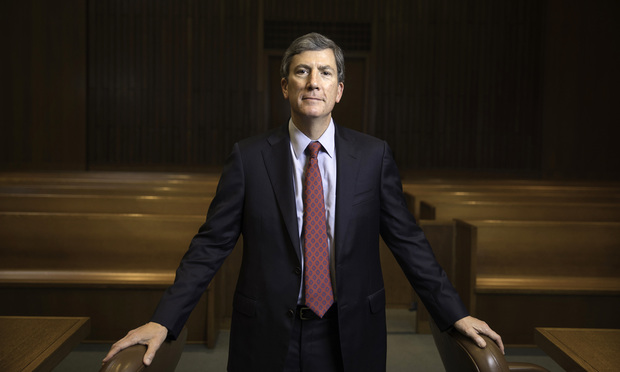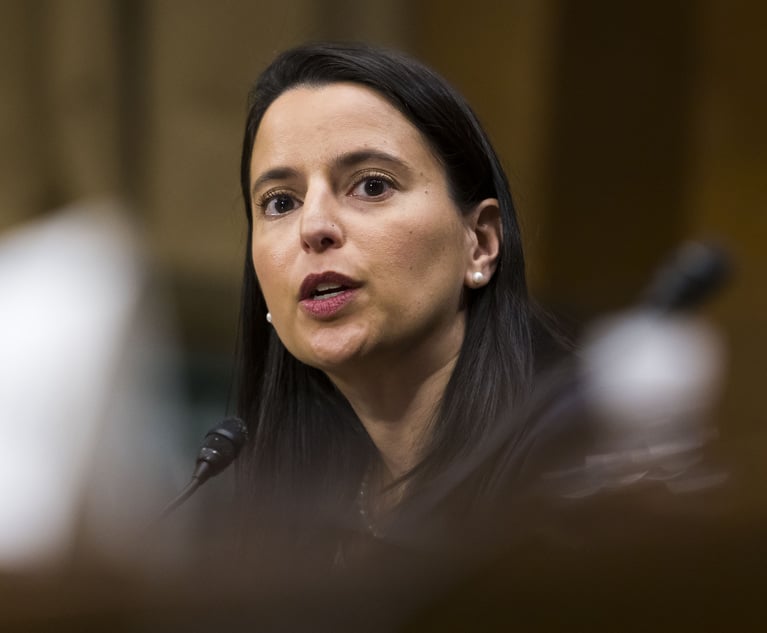Judge Once Again Expresses Skepticism Toward Trump Asylum Moves
U.S. District Judge John Tigar, however, defended a colleague in the District of Columbia whose ruling for the government in a similar case prompted a “hiss” from a member of the public when mentioned.
July 24, 2019 at 01:47 PM
4 minute read
 Judge Jon Tigar, U.S. District Court for the Northern District of California. Photo: Jason Doiy/ALM
Judge Jon Tigar, U.S. District Court for the Northern District of California. Photo: Jason Doiy/ALM
SAN FRANCISCO—DOJ lawyer Scott Stewart found himself in a familiar, uncomfortable position Wednesday—fielding skeptical questions on Trump administration changes to asylum rules from U.S. District Judge Jon Tigar of the Northern District of California.
Tigar last year blocked the administration's move to limit asylum to only those entering the country through an official port of entry despite Stewart's arguments that the policy was necessary to stem a crisis at the nation's southern border with Mexico.
On Wednesday, Stewart was defending the new rules barring asylum for anyone who hasn't applied for and been denied similar protection in a country they traveled through before arriving in the U.S.—a policy directed toward Central American migrants coming to the country through Mexico.
Tigar, early in the hearing, said the evidence of the inadequacy of Mexico's own system for dealing with asylum seekers was “stunning.”
“There's some pretty tough stuff in there,” said Tigar later of the government's own evidence. “Applications are up dramatically but there's no indication that the Mexican asylum process has grown.”
A group of nonprofit immigrant advocacy groups were in court Wednesday seeking an injunction blocking the changes. The organizations contend the rule effectively closed the door on asylum seekers, including unaccompanied minors, arriving from Central America via the country's southern border with Mexico. The organizations claim that the changes, made via a July 16 interim final rule from the attorney general and acting secretary of homeland security, violate the Immigration and Nationality Act, which says asylum seekers cannot categorically be denied based on their particular route to the United States.
Stewart noted in his opening remarks that a federal judge in Washington, D.C., earlier in the day allowed the asylum policy to move forward in the face of a separate legal challenge from other nonprofit groups, for now at least. U.S. District Judge Timothy Kelly o the District of Columbia, appointed by President Donald Trump in 2017, turned down a request for a temporary restraining order after finding there was not enough evidence to support claims of imminent harm.
In Tigar's packed-to-capacity courtroom, one member of the audience hissed during discussion of Kelly's order. Tigar momentarily stopped the proceedings to urge the audience member to “respect the dignity of the proceedings” and defended Kelly.
“I'm sure he's given this matter as much thought as I have,” Tigar said. The judge later added: “My point is that these are two district courts both trying to do their best work on an issue of national importance.”
Tigar last year blocked the administration's move to limit asylum to only those entering the country through an official port of entry.
Tigar's earlier ruling prompted a public complaint from the president, who railed about his administration's record in the “Ninth Circuit” before calling Tigar, in particular, an “Obama judge.” The president's remarks prompted a rare response from Chief Justice John Roberts who issued a statement just before Thanksgiving saying, “We do not have Obama judges or Trump judges, Bush judges or Clinton judges.”
The Ninth Circuit upheld Tigar's ruling shortly thereafter in an opinion written by Judge Jay Bybee, a George W. Bush appointee, and Roberts joined with the liberal wing of the U.S. Supreme Court in December again upholding the ruling.
The challengers in the Washington case, the Capital Area Immigrants' Rights Coalition and Refugee and Immigrant Center for Education and Legal Services, are represented by a team from Hogan Lovells. They argued the new rules violate the Immigration and Nationality Act, and the Administrative Procedures Act since there was no notice and comment period.
Tigar indicated at the end of Wednesday's hearing that he intends to issue a written order by the end of the day.
This content has been archived. It is available through our partners, LexisNexis® and Bloomberg Law.
To view this content, please continue to their sites.
Not a Lexis Subscriber?
Subscribe Now
Not a Bloomberg Law Subscriber?
Subscribe Now
NOT FOR REPRINT
© 2025 ALM Global, LLC, All Rights Reserved. Request academic re-use from www.copyright.com. All other uses, submit a request to [email protected]. For more information visit Asset & Logo Licensing.
You Might Like
View All
Hogan Lovells, Jenner & Block Challenge Trump EOs Impacting Gender-Affirming Care
3 minute read
Latham Adds Former Treasury Department Lawyer for Cross-Border Deal Guidance
2 minute read
Zoom Faces Intellectual Property Suit Over AI-Based Augmented Video Conferencing
3 minute readTrending Stories
- 1DeepSeek Isn’t Yet Impacting Legal Tech Development. But That Could Soon Change.
- 2'Landmark' New York Commission Set to Study Overburdened, Under-Resourced Family Courts
- 3Wave of Commercial Real Estate Refinance Could Drown Property Owners
- 4Redeveloping Real Estate After Natural Disasters: Challenges, Strategies and Opportunities
- 5Calif. Fires Should Serve as a Reminder to Fla.’s Commercial Landlords and Tenants Not to Be Complacent
Who Got The Work
J. Brugh Lower of Gibbons has entered an appearance for industrial equipment supplier Devco Corporation in a pending trademark infringement lawsuit. The suit, accusing the defendant of selling knock-off Graco products, was filed Dec. 18 in New Jersey District Court by Rivkin Radler on behalf of Graco Inc. and Graco Minnesota. The case, assigned to U.S. District Judge Zahid N. Quraishi, is 3:24-cv-11294, Graco Inc. et al v. Devco Corporation.
Who Got The Work
Rebecca Maller-Stein and Kent A. Yalowitz of Arnold & Porter Kaye Scholer have entered their appearances for Hanaco Venture Capital and its executives, Lior Prosor and David Frankel, in a pending securities lawsuit. The action, filed on Dec. 24 in New York Southern District Court by Zell, Aron & Co. on behalf of Goldeneye Advisors, accuses the defendants of negligently and fraudulently managing the plaintiff's $1 million investment. The case, assigned to U.S. District Judge Vernon S. Broderick, is 1:24-cv-09918, Goldeneye Advisors, LLC v. Hanaco Venture Capital, Ltd. et al.
Who Got The Work
Attorneys from A&O Shearman has stepped in as defense counsel for Toronto-Dominion Bank and other defendants in a pending securities class action. The suit, filed Dec. 11 in New York Southern District Court by Bleichmar Fonti & Auld, accuses the defendants of concealing the bank's 'pervasive' deficiencies in regards to its compliance with the Bank Secrecy Act and the quality of its anti-money laundering controls. The case, assigned to U.S. District Judge Arun Subramanian, is 1:24-cv-09445, Gonzalez v. The Toronto-Dominion Bank et al.
Who Got The Work
Crown Castle International, a Pennsylvania company providing shared communications infrastructure, has turned to Luke D. Wolf of Gordon Rees Scully Mansukhani to fend off a pending breach-of-contract lawsuit. The court action, filed Nov. 25 in Michigan Eastern District Court by Hooper Hathaway PC on behalf of The Town Residences LLC, accuses Crown Castle of failing to transfer approximately $30,000 in utility payments from T-Mobile in breach of a roof-top lease and assignment agreement. The case, assigned to U.S. District Judge Susan K. Declercq, is 2:24-cv-13131, The Town Residences LLC v. T-Mobile US, Inc. et al.
Who Got The Work
Wilfred P. Coronato and Daniel M. Schwartz of McCarter & English have stepped in as defense counsel to Electrolux Home Products Inc. in a pending product liability lawsuit. The court action, filed Nov. 26 in New York Eastern District Court by Poulos Lopiccolo PC and Nagel Rice LLP on behalf of David Stern, alleges that the defendant's refrigerators’ drawers and shelving repeatedly break and fall apart within months after purchase. The case, assigned to U.S. District Judge Joan M. Azrack, is 2:24-cv-08204, Stern v. Electrolux Home Products, Inc.
Featured Firms
Law Offices of Gary Martin Hays & Associates, P.C.
(470) 294-1674
Law Offices of Mark E. Salomone
(857) 444-6468
Smith & Hassler
(713) 739-1250







